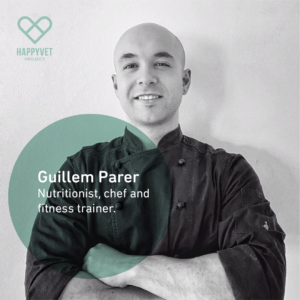Interview to Guillem Parer
Nutritionist, chef and fitness trainer
“Treat yourself as if you were the person you love the most”.
From chef to nutritionist
Guillem recalls moments from his childhood when he had fun in his family’s kitchens, especially those of his grandmothers, and the interest in health that his relatives dedicated to the field of medicine inspired in him. His passion for gastronomy, his desire to continue learning and his love of sport led him to study nutrition and dietetics. Currently, he has a personal chef company where he provides a personalised home-made healthy food service for those who want to take their food culture to the highest level of quality, proximity and physiological optimisation.
On a professional level, what do you do currently?
I mainly help people to eat better and improve their health through a personal home chef and nutrition service tailored to their needs.
On the other hand, I do courses, events… I collaborate with cooking schools, with nutrition and training centres, yoga instructors… and always come up with very nice projects, like this one. I am very grateful to be so often surrounded by wonderful professionals and experts in the world of nutrition and health.
Which five key foods should be part of a good diet?
It would be very interesting if most people had basic notions of nutrition and knew in what proportion they should be included on their plate. It would also be interesting for them to know that the foods that we should consume the most in quantity are vegetables, stems, etc. I don’t think there is a top five, but I will tell you five that I really like: garlic, berries (especially blueberries), leafy greens such as kale, canned sardines (in extra virgin olive oil) and eggs.
Do you think there is much nutritional difference between a vegetarian, supposedly healthier diet and an omnivorous one?
I don’t think there is a difference between diets as long as they are well thought out. Any well-planned diet is just as good. However, if we talk about health in general, food is only a fraction of the equation. Movement and rest are also key to maintaining health harmony.
You can follow whatever diet you think is best, but if you mismanage your stress, suffer from sleep deprivation, don’t have a healthy social circle and consider walking up the stairs to your flat to be sport…you probably have some health markers…at the very least, altered. And this maintained over time can lead to more complex problems.
Within the vegetarian and vegan diets, there are experts who recommend certain types of supplementation according to each case. The most common are vitamin B12, vitamin D, iron… but in the same way that an omnivore seeking to improve their diet may be recommended magnesium, calcium or zinc… depending on their level of physical activity and according to the professional’s criteria. Thinking in a dualistic way about “good and bad”, or “worse or better” in the field of nutrition is very relative. Each person has a unique bio-rhythm and particular preferences and conditions. If only we focused on eating more (real) FOODS instead of so many PRODUCTS… we would be probably on the right track.
How would you integrate healthy eating into the lifestyle of someone with very little time, like vets?
I would do a little weekly plan of all the meals (breakfast, lunch and dinner, for example) and schedule a few hours a week to organise shopping and do some batch cooking.
Having a plan makes it easy to translate it into a coherent shopping list, provides you with what you need and helps avoiding impulsive behavior, like buying products that are highly palatable, quick to consume, but full of ultra-processed ingredients. With our list made, we can group shopping and errands into the same time slots to make the best use of time or even have them delivered at home. We can also store products as we wish, taking advantage of this to keep the pantry and fridge tidy and clean. As a bonus, this routine allows you to better “organise” the waste generated by shopping.
And what about spending a lot of time cooking?
The shopping day could be also the cooking day: when we make some basic dishes in advance, taking advantage of the fact that we have all the fresh produce that has just arrived on our kitchen table already. In my case, I cook rice, quinoa and potatoes and cover all the carbohydrate sources for the week. Also, I bake two trays of vegetables for side dishes and marinate the meats and fish. This gives me three days’ worth of meal combinations – because… what’s really exhausting is having to improvise all the time! In the end, it’s about finding that sequence of small habits that, when added together, will allow us to generate am healthy diet routine, adapted to our lifestyle and synchronised with our busy lifes. Most of the time, it is not a lack of hours a day to think, cook and eat healthy, but a lack of making it a priority.
What do you think about the impact on health professionals (veterinarians, doctors, nurses, etc.) of the bad eating habits that their profession often imposes on them?
The scenario in which most health professionals carry out their work, such as long working hours, frenetic work rhythms during risky episodes, emotional stress, physical fatigue, exposure to pathogens… sometimes work against their own health. However, one decides one’s own habits on one’s own responsibility. We can always look for solutions within our own control to try to overcome it or to adapt to it. Making excuses or falling into victimhood is easy and comfortable… but it is not useful.
And how to overcome it?
Look for a concrete solution and gradually work out how to plan meals to take to work, have practical resources such as healthy snacks for moments of haste (frittatas, protein shakes, homemade bars, natural fruit or nuts) or simply drink water!( How many people don’t drink ANY water at work?) You can also share this vision with the practice manager to find a win-win solution, or get a professional or mentor to design a solution.
It is all too common to skip proper meals in order to finish work first and have a high calorie snack afterwards. Sometimes it is unavoidable but it should not be the rule. Take your time to eat. Respect other’s time to eat. Love yourself.
How would you approach a change of harmful habits in an anxiety’s self management context?
There is a very interesting idea: “treat yourself as if you were the person you love the most”.
Surprisingly often we don’t do this. Example: Instead of going to bed at your own time, trying to find a quiet environment to allow you to rest fully and efficiently… you put on a movie, get glued to your mobile phone, eat some sweets or some chips and go to sleep late at night with your digestion half-done and your brain even more saturated with superfluous information… the next morning you will probably find it more difficult to keep up the pace.
But what if you had the person you love the most in front of you doing the same thing… knowing that they are tired, that they are not eating well, that they are not taking care of their rest… What would you say to them? What would be your advice to them, what would you like them to improve, how would they feel if they started to take care of themselves? Aplly it to you…You might feel the same way.
What practical advice would you give to someone who REALLY wants to get started?
If you are starting out, do what you can with what you have. Start with whatever is easiest for you and do it out of curiosity. Let it be like a challenge or game where every day you try to improve a little bit. In this case, action surpasses perfection. With perseverance you will obtain better results little by little. Don’t get frustrated if you don’t get it right the first time or don’t know as much as you would like. There is no universal system or one-size-fits-all solution, but change comes from within.
Are you happy with what you do Guillem, did you find your mission in life?
I believe that being happy is a decision that one makes based on one’s own love. For oneself and for others. I am happy because I feel free. I live in a beautiful place, I live and work in what I am passionate about, I have a family I love, a wonderful team and I am always surrounded by food and after dinner conversations…
Of course I have bad days too but I try to learn. I see people who spend more time worrying about situations that are not favourable to them than trying to solve them. In events that can turn you upside down on a personal or emotional level, I think it is interesting to take advantage of suffering signals as an opportunity to evolve and better manage one’s behavioural responses to difficulties or complex situations…
One last piece of advice?
In good times, become stronger. And in bad times, resist with virtue.








